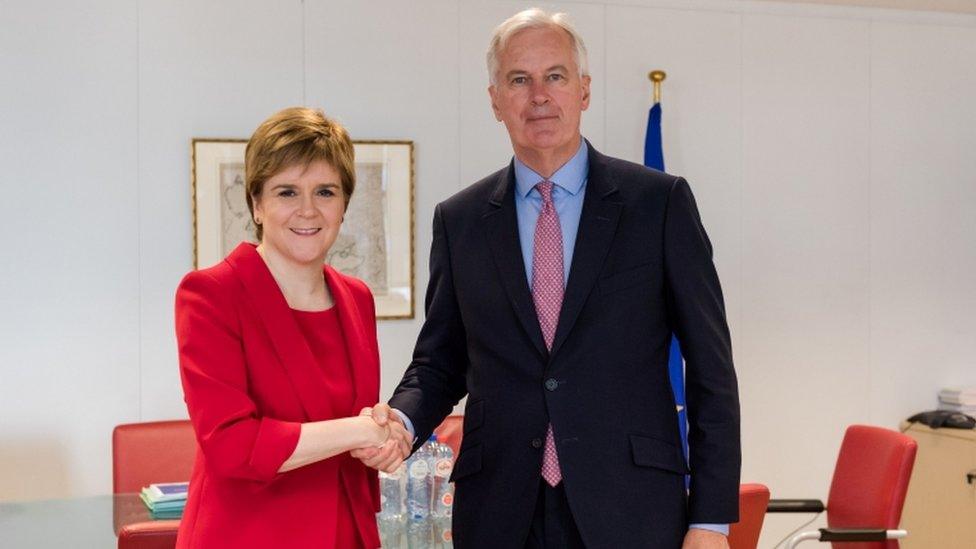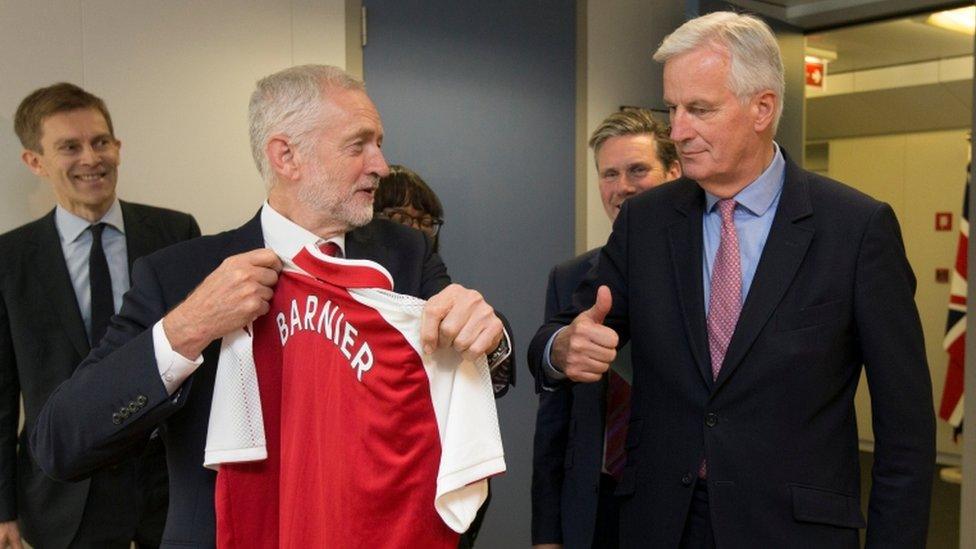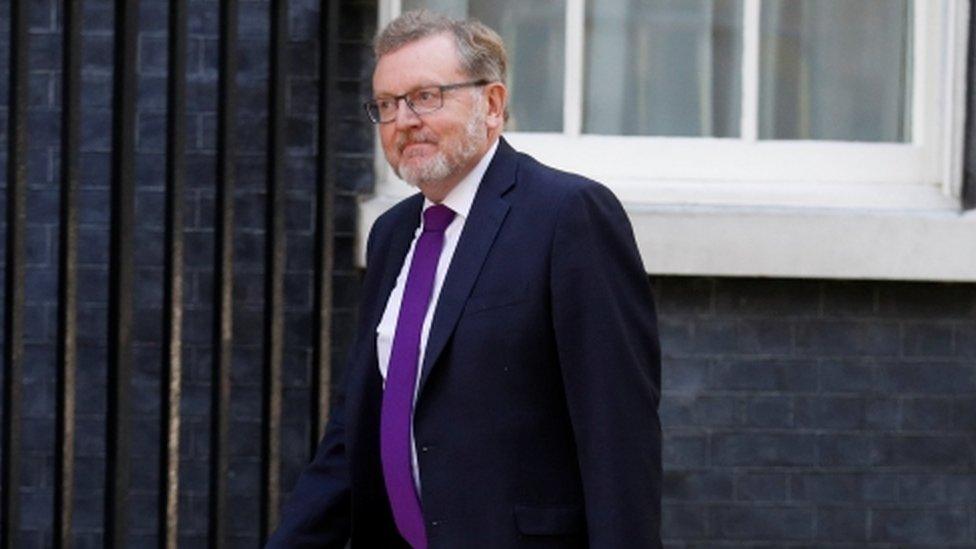Nicola Sturgeon claims Brexit repeal bill is a 'power grab'
- Published
- comments

Ms Sturgeon had a 45-minute private meeting with the EU's chief Brexit negotiator Michel Barnier on Thursday morning
Scotland's first minister has claimed that the UK government's bill to convert EU law into British law is a "naked power grab".
The repeal bill will ensure the same rules apply in the UK after Brexit.
But Nicola Sturgeon said it was not clear which powers repatriated from Brussels would be handed to the devolved nations.
Scottish Secretary David Mundell insisted the bill would result in a powers "bonanza" for Holyrood.
He said this could include areas such as environment, criminal justice, consumer rights and energy, which he said "could all in relatively short order come to the Scottish Parliament".
Mr Mundell confirmed the approval of the Scottish Parliament through a legislative consent motion would be required for the Bill
He said that separate legislation would be needed to cover areas such as fishing, farming and immigration, and a series of further bills could also require legislative consent from the devolved administrations.
And he insisted that the return of powers and responsibilities currently exercised by the EU to the UK was a "transitional arrangement" that would allow for the further onward devolution of powers.
In a briefing to journalists, he said: "This is not a power grab, it is a power bonanza for the Scottish Parliament because after this bill has been implemented the Scottish Parliament will have more powers and responsibilities than it has today.
"I'm happy to be held to account for that statement once the process has been delivered."
But in a joint statement issued by Ms Sturgeon and her Welsh counterpart Carwyn Jones, the two leaders said they could not recommend that legislative consent is given to the Brexit repeal bill as it stands.

Jeremy Corbyn gave Michel Barnier an Arsenal shirt with his name on it when the pair met in Brussels
The statement claimed that the bill was a "naked power grab, an attack on the founding principles of devolution and could destabilise our economies".
It added: "The European Union (Withdrawal) Bill does not return powers from the EU to the devolved administrations, as promised.
"It returns them solely to the UK government and parliament, and imposes new restrictions on the Scottish Parliament and National Assembly for Wales.
"On that basis, the Scottish and Welsh governments cannot recommend that legislative consent is given to the bill as it currently stands."
The statement was issued after Ms Sturgeon, Mr Jones and Labour leader Jeremy Corbyn held separate meetings with Michel Barnier, the EU's chief Brexit negotiator, in Brussels.

What is the repeal bill?
Formally known as the European Union (Withdrawal) Bill, the draft legislation is a key plank of the government's Brexit strategy
The first line of the bill says the European Communities Act 1972, which took Britain into the EU, will be "repealed on exit day"
This will end the supremacy of EU law and stop the flow of new regulations from Brussels
But all existing laws derived from the EU will continue to be in force - they can be changed or scrapped by further legislation
The bill does not detail policies line-by-line but transfers all regulations into domestic law
It gives the UK two years after Brexit to correct any "deficiencies" arising from the transfer

Ms Sturgeon described her 45-minute meeting with Mr Barnier as "useful and constructive", and said she used it to stress the importance of the UK remaining in both the European single market and the customs union.
And she said the Scottish government would "do all it can to build a consensus against an extreme Brexit outside the single market, which would have potentially catastrophic consequences for jobs, investment and our living standards".
Ms Sturgeon has consistently called for the Scottish government to have a "seat at the table" for the Brexit negotiations.
But after her meeting with Mr Barnier, she said: "We have always been clear that this is not about holding separate Scottish negotiations - it is for the UK as the member state to negotiate with the EU - and as such we will continue to work hard to influence the UK position.
"However, meetings like this are helpful in developing a mutual understanding between the Scottish government and the EU as these vital negotiations gather pace."

David Mundell insists Brexit will lead to a "powers bonanza" for the Scottish Parliament
The meeting was held as Mr Barnier prepares for the second round of talks between the UK and EU, which will begin on Monday.
Speaking on Wednesday, Mr Barnier stressed that Brexit negotiations would only be done with the UK government.
But he said he had always made clear that he would "listen to different points on view in the British debate".
Ms Sturgeon has previously called for a "short pause" in the Brexit process so consensus can be built across the UK on the best way forward.
The first minister wants membership of the European single market and the customs union to be at the heart of the process, but Prime Minister Theresa May has insisted the UK will be leaving both.
The UK government has also previously rejected Ms Sturgeon's calls for the Scottish government to be involved in the Brexit talks, and for Scotland to keep its single market membership even if the rest of the UK leaves.
It has pledged to "consult" with the UK's devolved administrations during the Brexit process.